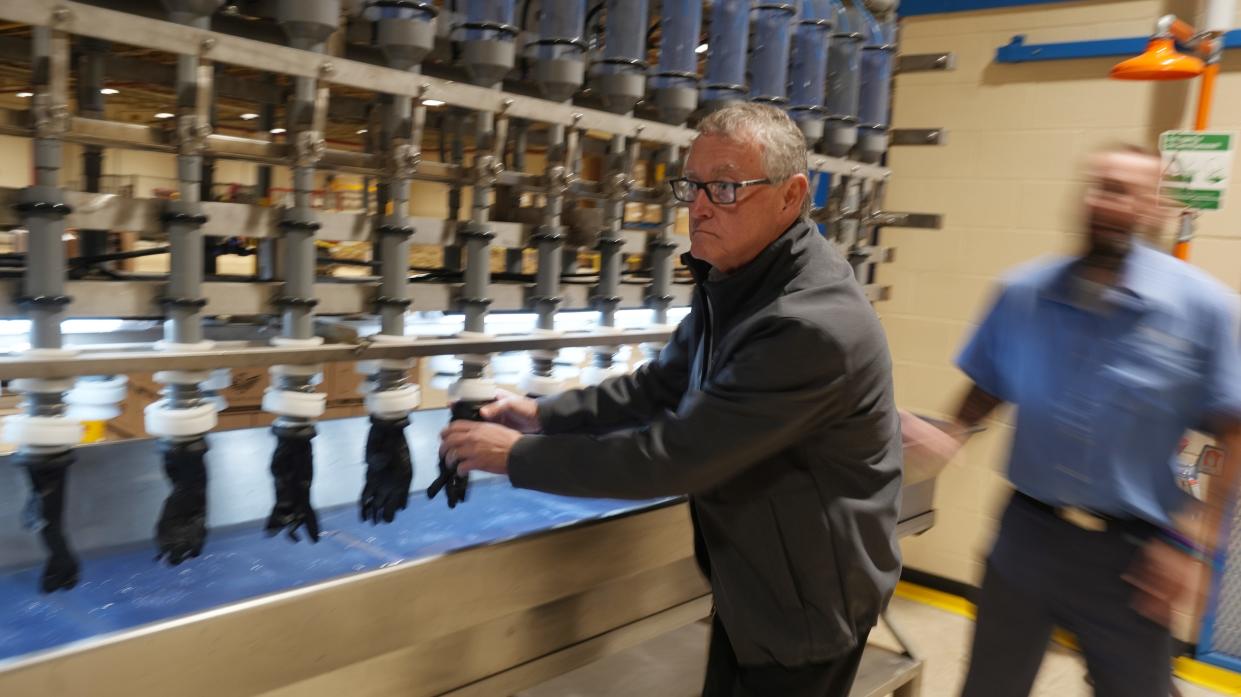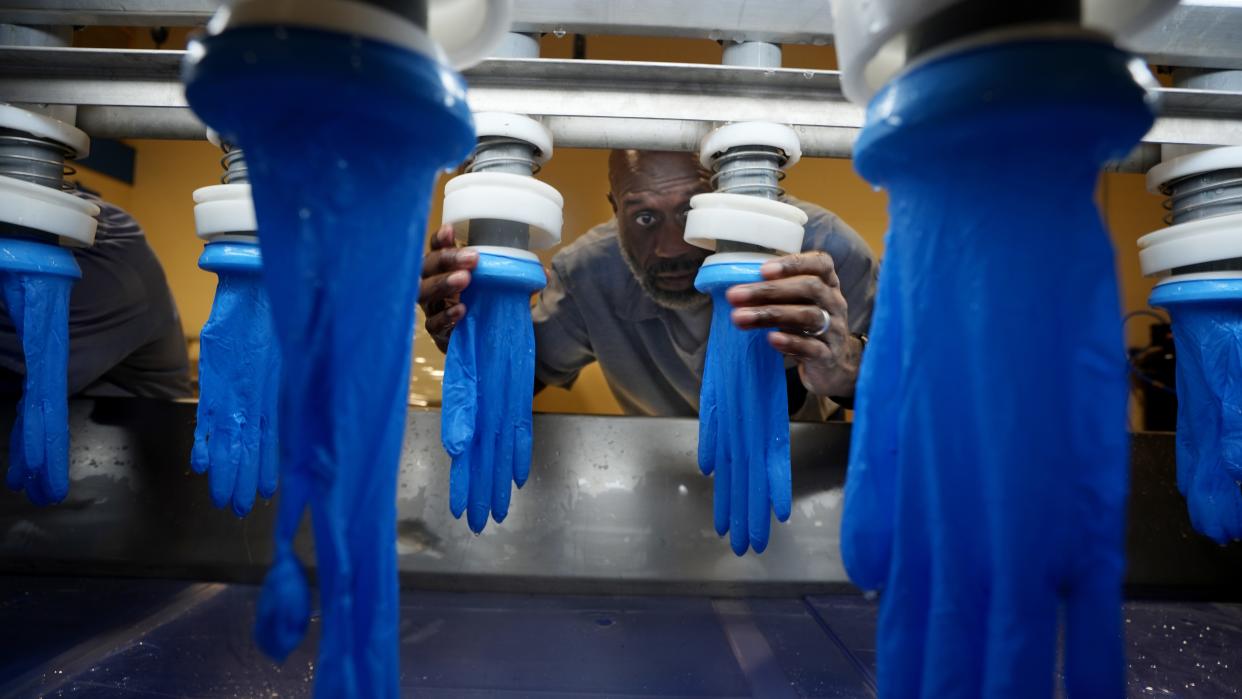Summit Glove, University of Akron collaborate on glove manufacturing at state prison
LONDON − About 20 people who are incarcerated at the Madison Correctional Institution sit around long tables with laptops in an otherwise empty warehouse.
The men spend six hours a day, seven days a week studying and training so that they can manufacture nitrile gloves come spring.
They're part of a new Ohio Penal Industries and University of Akron program to earn an associate degree in polymer technology and produce gloves for state agencies using Summit Glove's proprietary designs. It's a project three years in the making.
"We saw the need when we did have procurement issues throughout the pandemic," Ohio Penal Industries Chief Ann King said. "So we just started doing research. What schools had polymer science. What schools could we go to to ask for assistance. What companies could we reach out to that could help us with consulting in the program."
Ohio Penal Industries, the for-profit arm of the state prison system not supported by taxes, has a total of 45 workers interested in the initiative. It involves cycles of classes for those who want a degree and training from Summit Glove, which is based in Minerva.
“They’re using our intellectual property, in other words, our formulas and our training of the workers on how to produce the gloves," said Jim Hull, president of Summit Glove.
Ohio Penal Industries has invested $11 million in the equipment and other startup costs and is paying for the university degrees, King said. Incarcerated workers are paid hourly wages ranging from 49 cents to $1.35 with additional compensation for longevity and work performance.
“We’re doing our part at Ohio Penal Industries to try to provide skills and credentials, education, so that we’re releasing someone that has the ability to be successful," King said.
The Ohio Department of Rehabilitation and Corrections releases about 18,000 people a year.
University of Akron professor Sadhan Jana: There is a shortage of these skills
American Nitrile ― which operates a 530,000-square-foot factory in Grove City ― also uses Summit Glove's patents and is committed to hiring men after they're released, according to Hull and the university. The private company is the largest manufacturer of nitrile gloves in the United States.
Sadhan Jana, a professor in the University of Akron College of Engineering and Polymer Science, said in a prepared statement that the school is happy to assist with the education of incarcerated adults.
"We are glad that they can get a degree and go take up a job in the polymer industries where there is a shortage of such skills," he said.
The particular glove that will be made at the Madison Correctional Institution was formulated by Summit Glove in 2017. As a precaution for first responders, they're resistant to various chemicals, such as opioids or acid. The gloves are also designed to be more durable with a black exterior and green interior to make any holes or tears easy to see.
"We're in the safety business," Hull said.

King said Ohio Penal Industries expects to produce 17 million to 20 million gloves per year, supplying state agencies first and then possibly the larger market. A lab and testing equipment already are on-site.
The first of three large machines that fabricate the gloves should arrive in December or January. They dip ceramic hands into liquid latex or rubber alternatives, wash the hands, and dip them again.
Before sales begin, the gloves will need to meet international quality control standards and be approved by the U.S. Food and Drug Administration as a medical disposable glove.
"This is not a simple task," Hull said. "There’s a lot of commitment to getting this stuff.”
Ohio prison inmates appreciate the Ohio Penal Industries program
Lloyd Black of Columbus was incarcerated in 1995 and has worked for Ohio Penal Industries since 1999. He demonstrated a glove strength testing device where a "dogbone" cutout is attached to a machine and stretched until it breaks. A computer records the result for analysis.
The technical and chemical aspects of glove-making appealed to Black, who said Ohio Penal Industries gave his days in prison structure. It's also built his confidence and ability to overcome challenges.
"Time was slow," Black, 53, said of the earlier days.
Although he is serving a life sentence, Black is optimistic about a parole board hearing in 2025 and his potential release. He hopes his Ohio Penal Industries work shows that he won't return and will be an asset to the community.
"This job right here makes it even more so because, first and foremost, it's something that's needed," he said. "Two: This stuff right here tells people that I didn't come here twiddling my thumbs. I actually did learn some stuff. I made use of my time."

To be eligible for Ohio Penal Industries placement, inmates must follow the rules of the correctional facility and have a high school degree or be working on their GED. King said they typically recruit people who are serving terms of five years or less.
“Once they get the skills that they need, the degree that they need, they’re going to be released and have the opportunity to utilize those," she said.
Jeremiah Bintner, 42, of Marysville said that's just what he wants to do. Ohio Penal Industries employs about 1,200 incarcerated adults in 27 different operations across the state. He chose the glove manufacturing program because "you learn something new every day" and, being from the area, Bintner eventually wants to work at American Nitrile.
"It gives me a better chance to succeed when I get on the outside," he said. "I can get a job, hopefully, right away."
Reach Kelly at 330-580-8323 or kelly.byer@cantonrep.comOn X, formerly known as Twitter: @kbyerREP
This article originally appeared on The Repository: Summit Glove, University of Akron collaborate on prison glove project
